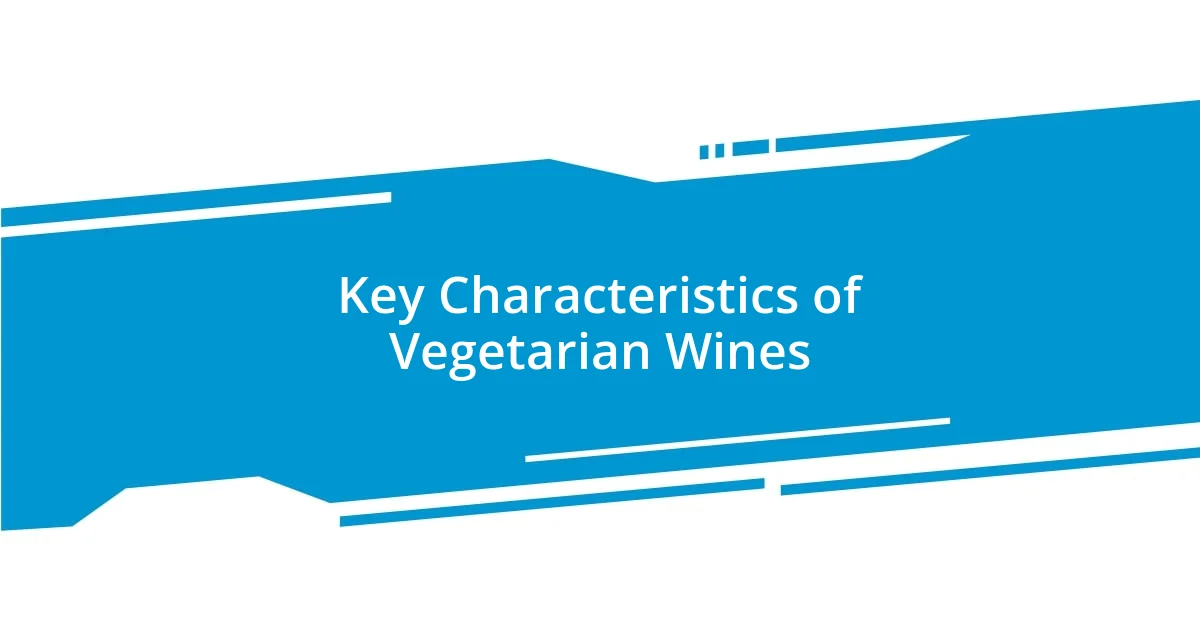Key takeaways:
- Balance flavors: Choosing wines like Sauvignon Blanc or Pinot Grigio enhances the natural ingredients in vegetarian dishes without overpowering them.
- Seek vegetarian-friendly options: Look for wines labeled as vegan or vegetarian, as they avoid animal-derived fining agents.
- Sustainability focus: Many vegetarian wines emphasize organic and sustainable practices, creating a deeper connection to the earth and enhancing the overall experience.

Understanding Vegetarian Wine Pairing
When it comes to wine pairing with vegetarian meals, the key is to find a balance that highlights the ingredients without overpowering them. I remember enjoying a plate of roasted vegetables paired with a crisp Sauvignon Blanc; the wine’s acidity complimented the earthiness of the veggies beautifully. Have you ever experienced that perfect harmony between food and wine where one elevates the other?
I often ask myself how certain wines can bring out the flavors in a dish, especially when it comes to lighter fare. For instance, I once tried a creamy risotto and discovered that a light-bodied Pinot Grigio made the dish feel even more vibrant. The freshness of the wine matched the creaminess and added a refreshing contrast, enhancing my entire dining experience. Isn’t it fascinating how the right wine can transform a meal?
Another thing to consider is the complexity of flavors in vegetarian dishes, which can vary widely depending on the ingredients used—think spices, herbs, and textures. When I had a spicy chickpea curry, I chose a slightly sweet Riesling, and it was like the wine and the dish were meant to be together. The sweetness tamed the heat while allowing the curry’s spices to shine, leaving me with a delightful memory that keeps me coming back for more. What’s your go-to wine for balancing those big, bold flavors?

Key Characteristics of Vegetarian Wines
When I think about vegetarian wines, the absence of animal-derived fining agents stands out as a key characteristic. Many winemakers utilize methods like egg whites or fish bladders to clarify their wines, but for those of us seeking vegetarian-friendly options, it’s essential to choose wines that are labeled as vegan or vegetarian. I remember the first time I spotted that little green leaf on a wine bottle; it felt like a little win for my values.
Additionally, the vibrant, fresh profiles of many vegetarian wines often mirror the ingredients found in plant-based dishes. I recall enjoying a vibrant Grenache with a summer tomato salad, where the light, fruity notes of the wine highlighted the fresh flavors of the tomatoes and herbs. This connection between the wine and the food isn’t just coincidental; it’s a reflection of how thoughtfully selected wines can create memorable dining experiences.
Finally, the overall philosophy behind vegetarian wines tends to focus on sustainability and organic practices, which resonate deeply with my lifestyle. I recently discovered a biodynamic Pinot Noir, and the winemaker’s passion for natural farming truly shone through in each sip. I couldn’t help but feel a sense of connection to the earth with every glass, and I wonder if you’ve felt that same sense of synergy with your wine choices.














